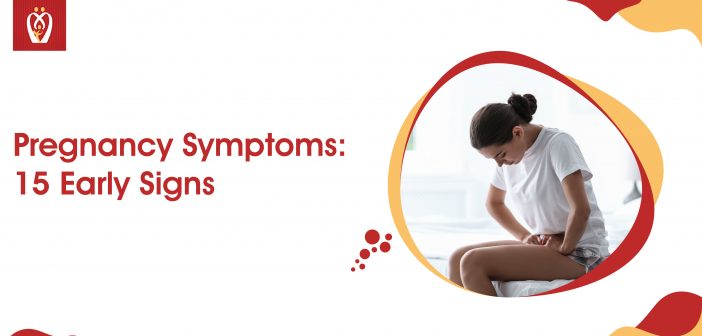While pregnancy tests and ultrasounds are the only ways to determine whether or not you’re pregnant, you can look for other signs and symptoms. A missed period isn’t the only sign that you’re pregnant. They could also include:
- morning sickness
- smell sensitivity
- fatigue
Although it may seem unusual, the date of your last menstrual period decides your first week of pregnancy. Even if you weren’t pregnant at the time, your last menstrual period is considered week 1 of pregnancy.
The expected delivery date depends on the first day of your last period. As a result, you may experience no symptoms during the first few weeks of your 40-week pregnancy.

Pregnancy signs and symptoms
If you are pregnant, you may notice the following symptoms:
- mild cramping and spotting
- missed period
- fatigue
- nausea
- tingling or aching breasts
- frequent urination
- bloating
- motion sickness
- mood swings
- temperature changes
Other symptoms may include:
- high blood pressure
- extreme fatigue and heartburn
- faster heartbeat
- breast and nipple changes
- acne
- noticeable weight gain
- pregnancy glow
Early pregnancy cramping and spotting
At the cellular level, nothing changes from week one to week four. The fertilized egg produces a blastocyst (a fluid-filled group of cells) that develops into the organs and body parts of the fetus.
The blastocyst will implant in the endometrium about 10 to 14 days (week 4) after conception. It can result in implantation bleeding, which women may mistakenly consider a lighter period. It does not happen to everyone. If it doesn’t, it usually occurs around the time you expect your period to start.
If you suspect implantation bleeding, follow these steps:
Stop smoking, consuming alcohol, and using illegal substances.
Do not use a tampon. Using a tampon may increase your risk of infection.
The missed period during early pregnancy
Once implantation is complete, a pregnant woman’s body will start producing human chorionic gonadotropin (hCG). This hormone helps the body’s ability to keep them going. It also signals the ovaries to stop the production of mature eggs every month. 4 weeks after conception, you will most likely miss your period. You should confirm your pregnancy with a test if you have an irregular period.
Most home tests detect hCG as early as eight days following a missing period. A test can identify hCG levels in your urine and help figure out if you’re expecting.
Increased body temperature during early pregnancy
A higher basal body temperature could indicate pregnancy. Exercise and hot weather may also cause your core temperature to rise more quickly. Drink plenty of water and exercise with caution during this time.
Early pregnancy fatigue
During pregnancy, fatigue can happen at any time. It’s a common early symptom. Your progesterone levels will skyrocket, making you sleepy.
Rise in heart rate during early pregnancy
Your heart may beat faster and harder around weeks 8 to 10. During pregnancy, palpitations and arrhythmias are common. Hormones are usually to blame for this, your blood flow may increase by 30% to 50%. It puts increased stress on your heart.
If you have any underlying heart problems, now is the time to see your GP. The Nurturey pregnancy app instantly books your GP/midwife appointment.
Breast changes during early pregnancy: tingling, aching, and growth
Between weeks 4 and 6, breast changes are possible. Hormone changes are likely to cause tender and swollen breasts. It will subside after a few weeks as your body adjusts to the hormones. Nipple and breast changes are also possible around week 11. Hormones continue to cause breast growth. The areola — the area around the nipple — may darken and become large. It’s also possible to experience breakouts again if you had acne before becoming pregnant.
Mood swings during early pregnancy
During pregnancy, your estrogen and progesterone levels will elevate. This increase may affect your mood, making you more emotional or reactive than your normal state. Mood swings are common during pregnancy and can result in:
- depression
- irritability
- anxiety
- euphoria
Urine frequency and incontinence during early pregnancy
Your body increases the amount of blood it pumps. As a result, your kidneys process more fluid than usual, resulting in more fluid in your bladder. Hormones are responsible for bladder health as well. You may frequently be running to the bathroom more or accidentally leaking.
Early pregnancy bloating and constipation
Bloating early can be similar to menstrual symptoms. It could be due to hormonal changes, which can also cause your digestive system to slow down. As a result, you may feel constipated and blocked. Constipation can also amplify abdominal bloating.
Early pregnancy morning sickness, nausea, and vomiting
Nausea and morning sickness usually appear between weeks 4 and 6, peaking around week 9. Although referred to as morning sickness, it can happen at any point of day or night. The exact cause of nausea is unknown, but hormones may play a role.
Many women experience mild to severe morning sickness during their first trimester. It may become severe near the end of the first trimester but usually subsides as you enter the second trimester.
Dizziness and high blood pressure during early pregnancy
High or normal blood pressure will usually drop during the early stages of pregnancy. You may experience dizziness because of your dilated blood vessels.
Pregnancy-related high blood pressure, or hypertension, is harder to diagnose. Almost all cases of hypertension in the first 20 weeks point to underlying issues. It can appear during early pregnancy, but it can also happen before.
Smell sensitivity and food dislikings during early pregnancy
Smell sensitivity is a common early pregnancy symptom that is self-reported and during the first trimester has little scientific support. However, it may be significant because smell sensitivity can cause nausea and vomiting. It may also cause a strong aversion to certain foods.
During pregnancy, your sense of smell may be enhanced or reduced. During the first and third trimesters, this is especially common. A strong smell is more common than a weaker smell. Some smells you used to enjoy may become less appealing or cause nausea.
The good news is that your sense of smell usually returns to normal within 6 to 12 weeks after delivery.
Weight gain during the first trimester
Gaining weight becomes more common near the end of your first trimester. You may gain between 1 and 4 pounds in the first few months.
Calorie recommendations will be similar to your regular diet but will increase as the signs progress.
Having heartburn during early pregnancy
Hormones can relax the valve that connects your stomach and esophagus. It allows stomach acid to escape, resulting in heartburn.
Early pregnancy acne and pregnancy glow
Many people may start to refer to you as having the “pregnancy glow.” More blood flows through your vessels because of increased blood volume and hormone levels. It causes the oil glands in the body to work extra hard.
The increased activity of your body’s oil glands causes your skin to appear flushed and glossy. Acne, on the other hand, is possible.
How will the Nurturey Pregnancy app help you?
If a home pregnancy test gives a positive result, you should contact your GP as early as possible. With the Nurturey pregnancy app, you can book an appointment with your GP if you have any pregnancy concerns.
Also, the Nurturey PinkBook is the best alternative to the NHS RedBook. The Nurturey Pink book gives you access to your child’s health records, upcoming health checkups, and trusted NHS information relevant to your stage of parenting. Parents and expecting mothers can also connect their GP accounts to the PinkBook. As a result, if dealing with becomes difficult, you can make appointments with your doctor, reorder prescriptions, and message your doctor yourself through Nurturey.
Conclusion
During early pregnancy, your body will undergo significant changes. You may notice symptoms like nausea, breast tenderness, and the dreaded missed period.
A home test is a good start if you suspect you’re pregnant. These tests are widely available in pharmacies and other stores without a prescription.
If you get a positive result, make an appointment with your GP. They will examine you and run additional tests to confirm. You can then begin a prenatal program to protect your and the fetus’s health.







